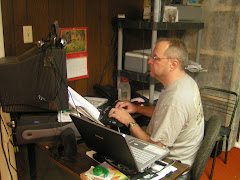Gratitude
I got the following news item from a Web site that reports bizarre news stories. Obviously, the circumstances are bizarre: how often does a man spend 19 years in a coma and then come back to take his normal place in the world? But it emphasizes another point that fits in nicely with this forum – that most people would rather complain about circumstances than take steps to improve them.
This is not an observation that the world is going to hell in a hand basket. I am certain that if we could travel to any era of human history, it was the same. The people that Noah was preaching to in warning probably complained about society, the price of gopher wood, or the noisy neighbors among themselves, to say nothing of this strange man who was calling them to repentance.
Here is the item as I received it:
WARSAW, Poland - A Polish man who spent 19 years in a coma awoke to a whole new world, but he said people still find things to complain about. "When I went into a coma, there was only tea and vinegar in the shops," Jan Grzebski, 65, told a Polish news channel. "Meat was rationed and there were huge petrol queues everywhere." "Now I see people on the streets with cell phones and there are so many goods in the shops it makes my head spin," he Grzebski said.
"What amazes me is all these people who walk around with their mobile phones and yet they never stop moaning."
Grzebski, a railway worker, went into a coma after he was hit by a train in 1988. Doctors predicted he would live for two or three years. His wife moved him every hour for 19 years so he wouldn't get bedsores, The Independent reported.
The thing that bothered our railway worker friend was not the surprise upgrade in societal prosperity, but the fact that despite how much better things were in their lives 19 years later, people still continued to complain about conditions. They no longer had to endure meat rationing and waiting in line to buy gasoline, but they still felt the need to complain.
We have to assume that people would generally find it difficult to be grateful while in the midst of a rant or a lamentation. Somehow our focus on the negative diverts our attention away from the uplifting and edifying.
And there is a powerful endorsement of gratitude. Gratitude, of course, does much more than accentuate the upbeat and pleasant. It is much more than just a feel-good method of maintaining a positive mental attitude. We will address this in greater depth in a future article. For now, however, let’s focus on this: there is much more to be grateful for than to complain about, if that is the direction our attentions take us. If we focus on the good, we have a hard time focusing on the bad.
Our focus is like powerful nourishment to the object of our focus. What we focus on grows and thrives. Isn’t that the nature of focus? – we see the object of our focus more closely and with greater clarity than other objects.
Henry Ford once said, “Obstacles are those frightful things we see when we take our eyes off our goal.” If the focus of our thoughts and actions is the ennobling and joyful things that God has provided for us, the obstacles to our happiness gets pushed off to the side and remains in our peripheral vision: if we hardly notice the obstacles, they just don’t get in our way.
This is not an invitation to be Pollyanna. Life does require some pain and suffering. They don’t call it the veil of tears for nothing. On the other hand, why let the challenges, trials and pains of life control us or dictate to us how we should feel? Indeed, they will not if we always remember to be grateful for the good that is there for us.


1 comment:
well done, well written, thoughtful...as usual, I find Mark to be brilliant and his writing is often invigorating and stimulating. Thanks Mark, J. Steineckert
Post a Comment